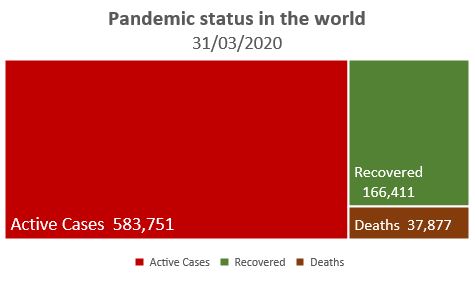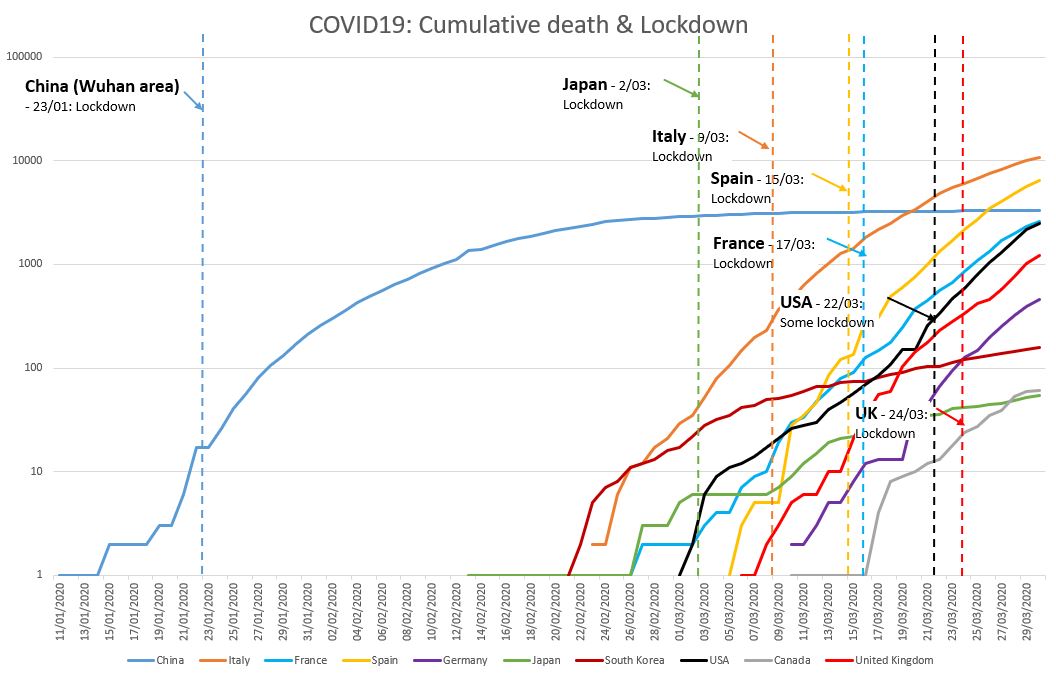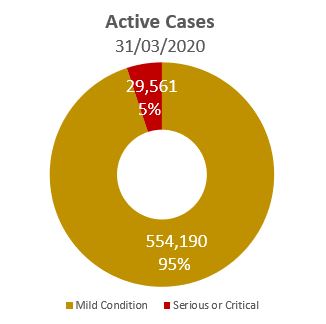COVID19 - An overview of the world situation
Only 3 months done in 2020 and we already know that year 2020 will enter in History books as one of the major event in the 21st century! The pandemic that has spread around the world rapidly started in December 2019 in the Wuhan area, at the heart of China (although some say it might have been even as early as September - and many think that the Chinese government is still hiding the real amount of deaths, that might go up to 40,000).
As of today, end of March, up to 3 billions people are in lockdown and the planet is more or less at a stand still with more than 170 countries affected... But while it is now agreed that the rapid reaction to the situation is critical in the fight against the pandemic, many countries are still adapting.
On the graph below (data from European Centre for Disease Prevention and Control), we have compared the reaction of some countries while the virus was hiting the world: it appears clearly that some have been slower than others to declare a lockdown of the population (so far the only way to stop the expansion of the pandemic and limit the number of death); or, at least, they refused to extrapolate from the situation in China or Italy, and waited until a certain marker to decide appropriate measures.
The UK is a good example as on March 3rd, the Prime Minister was still boasting about shaking hands with COVID19 patients in hospital (he's been diagnosed with the desease more recently) and they waited until the death toll reached 100 to decide the school closure, despite all the news of the virus hitting other countries!
It is possible to see many figures and analysis on the website Worldometer/Coronavirus, with daily update, global count and breakdown by country.
While many countries have repatriated their own citizens, many of them are still abroad, either because they are confined by local curfews in provincial towns across the globe and unable to fly back home because airports have been closed, or just because they are long term expatriates.
Measures taken in different countries
Below we list a series of countries with the latest situation. Of course this is meant to evolve constantly and you can comment in the section below in order to provide more accurate information.
We have recorded some information in term of lockdown, curfew, restrictions, including the possibility to enter the country. The EU sealed its external borders on 18 March to anyone from outside the bloc for at least 30 days. Canada and the US have also imposed restrictions.
- Argentina: lockdown
- Austria: lockdown
- Australia: curfew. The country has banned entry to all foreigners, telling all citizens and residents who return to the country they must go into quarantine for two weeks.
- Brazil: curfew
- China: lockdown partially lifted in the area of Wuhan where coronavirus is said to have originated. China imposed what is probably the most extreme lockdown so far from 23 January, with all journeys in and out of the city banned - even for those medical or humanitarian reasons. Two months later, on 24 March 2020, Chinese Premier Li Keqiang reported that spread of domestically transmitted epidemic has been basically blocked and the outbreak has been controlled. China has now announced it will lift the lockdown on Wuhan on 8 April. Similar lockdown measures have already been lifted (since 25 Mar) for other cities in Hubei province, of which Wuhan is the capital.
- Costa Rica: curfew
- Egypt: curfew is in effect from 7pm to 6 am
- Denmark: curfew
- France: The country went into full lockdown on Tuesday 17 March, with citizens banned from leaving their homes except to buy food or essentials, visit the doctors, or travel to a job that is certified as not being possible to do from home. Citizens must carry a document that certifies why they are outside, which must be shown to security forces. The police is strictly enforcing rules, and several cases of abuse from the police have been reported already (apparently they can fine you if they don't consider your shopping as "essential" - which is not defined anywhere!).
- Georgia: curfew is in effect from 9pm to 6am
- Germany: restrictions regarding social contact and shutdown of many industries nationwide since 2020-03-23. The government has been reluctant to impose a lockdown and instead prefered to rely on the population responsible behaviour. Howeve, the government banned gatherings in churches, mosques and synagogues and ordered non-essential shops as well as playgrounds shut. Venues including clubs, bars, leisure facilities, zoos and playgrounds are closed. Restaurants will have to enforce a minimum distance between tables and work under restricted hours. Schools across the country have already been closed.
- Greece: lockdown
- India: strict lockdown (21 days). The country has suspended all visas for foreigners until mid-April. India's iconic monument Taj Mahal has shut down.
- Indonesia: local lockdown, Tegal City Government plans to implement local: lockdown starting March 30, 2020. The policy was taken following a resident of Tegal City who was positively infected by the coronavirus.
- Iran: Public gatherings, including Friday prayers in Tehran and other major cities, have been cancelled. Schools have been closed and crews of cleaners have been dispatched to disinfect trains, buses and gathering places.
- Ireland: restrictions on movement and gatherings
- Israel: lockdown
- Italy: strong lockdown. Travel is only allowed for “urgent, verifiable work situations and emergencies, or health reasons”, and anyone who has tested positive for coronavirus must not leave their homes for any reason. Both universities and schools are closed, with exams now cancelled, and all gatherings in public places have been banned, not just large-scale events. All shops and restaurants are closed, with the exception of grocery stores and pharmacies. All leisure venues, including ski resorts, have also closed, and sporting events have been cancelled. Religious institutions have remained open, although people are to stay a metre from one another. Marriage ceremonies, baptisms and funerals have been banned. Anyone trying to move from one city to another has to complete and present a form stating their urgent reason for trave, and the absence of justification could trigger a fine.
- Japan: Japan, which earlier banned entry to visitors from certain areas of China and South Korea, has now extended this to 21 European countries and Iran, and is telling arrivals from the US to go into quarantine for 14 days.
- Mexico: curfew
- Malaysia: curfew (originally 14 days; expanded to 28 days). For those who have just returned from overseas, they are required to undergo a health check and to do a quarantine for 14 days. Malaysia is barring people crossing the border with Singapore from Wednesday, sparking a rush on food stores in the city state, which depends on Malaysia for supplies.
- Nepal: lockdown
- Netherlands: restrictions on gatherings
- New Zealand: national lockdown for four weeks excepting essential services. Borders closed except to citizens, permanent residents, diplomats and crews. Mandatory quarantine for every person entering the country for 14 days
- Panama: Panama orders social distancing... by gender. From Wednesday, men and women will only be able to leave their homes for two hours at a time, and on different days.
- Paraguay: lockdown
- Philippines: curfew. The Philippines became the first nation to shut its stock exchange indefinitely.
- Romania: lockdown
- Russia: curfew for Moscow from March 28 till April 5. The parliament has adopted amendments that could jail those breaking coronavirus quaranine rules as well as those spreading fake news about the epidemic.
- San Marino: lockdown
- Saudi Arabia: lockdown starting March 15. Local: curfew from March 25 for 21 days (6am until 7pm, except Riyadh, Jeddah, Medina and Makkah 6am until 3pm).
- South Africa: lockdown from March 26 till April 15
- Spain: lockdown
- Singapore: partial lockdown from March 27 till April 30. Singapore has banned entry to all foreigners, stopping visitors entering and requiring all citizens, permanent and long-term residents to self-isolate at home for 14 days.
- South Korea: Anyone arriving from abroad, including their own citizens, has to self-isolate for two weeks. People in cities across the county have been encouraged to stay home, some offices have closed, and many events are postponed. The nation's schools are closed.
- Sri Lanka: curfew
- Switzerland: curfew
- Taiwan: mandatory self-isolation for everybody
- Tunisia: night curfew
- United Kingdom: Initially the UK was slow to react. At first, the U.K. strategy was an attempt to build “herd immunity,” involved allowing
“enough of us who are going to get mild illness to become immune,” (~60% of the population) Sir
Patrick Vallance, the U.K. government’s chief scientific adviser, told
Sky News. That's only after new simulations of the outbreak
from Imperial College London showed how badly hospitals would be
overwhelmed, prediction between 250,000 and 500,000 deaths, that the UK government suddenly reversed course on Monday 16th March.
However, while Italy, then France closed schools some weeks before,and went into lockdown, Prime Minister announced to close all schools by Friday 20th March (only when the death toll reached 100 on Wednesday 18th March). Pubs were ordered to shut down over that weekend and eventually, by Tuesday 24th, instruction to stay at home was issued (however construction workers are still allowed to carry on as long as they stay within two metres of each other). The police has the power to enforce the order but rules are not so clear and senior officers have said that they needed to seek the consent of the public. - United States of America: The US have been issuing "voluntary" stay-at-home orders. San Francisco and five other Bay Area counties in California have ordered all residents to “shelter in place, effective until 7 April. However, all businesses that are considered non-essential, such as bars and gyms, have been ordered to close, but the likes of pharmacies, grocery stores, petrol stations, and restaurants serving takeaway will remain open. New York has also been placed under lockdown since 22 March, requiring residents to stay at home. On March 30th, 30 States had decided a general lockdown, with 11 States choosing a partial confinement.President Trum was told on 31st March the up to 2.2 millions Americans could die if social distancing measures were not implemented.
- Venezuela: lockdown
- Serbia: curfew from 5 pm to 5 am
[Sources: Wikipedia, BBC & BBC, EdinburghNews, Telegraph, NPR, National Geographic, politico.eu]
To finish on a more positive note, we need to remember that most people who contract the disease recover and 95% of the cases have only mild-symptoms.
French & British national
CEO Habilis Digital Ltd


